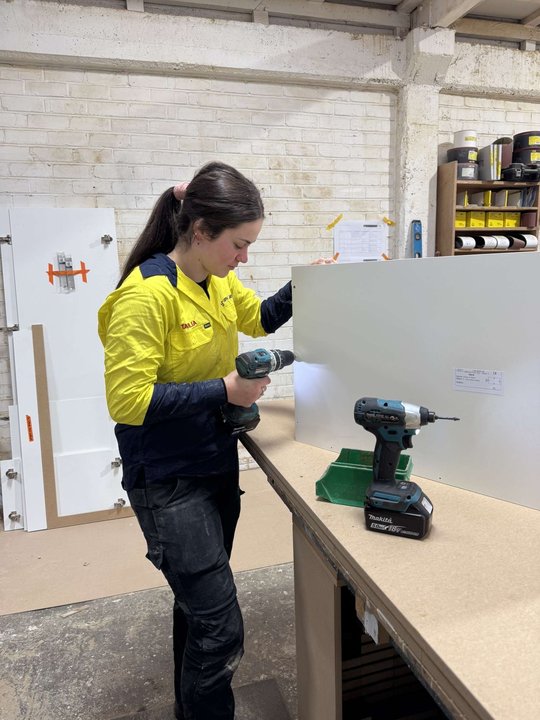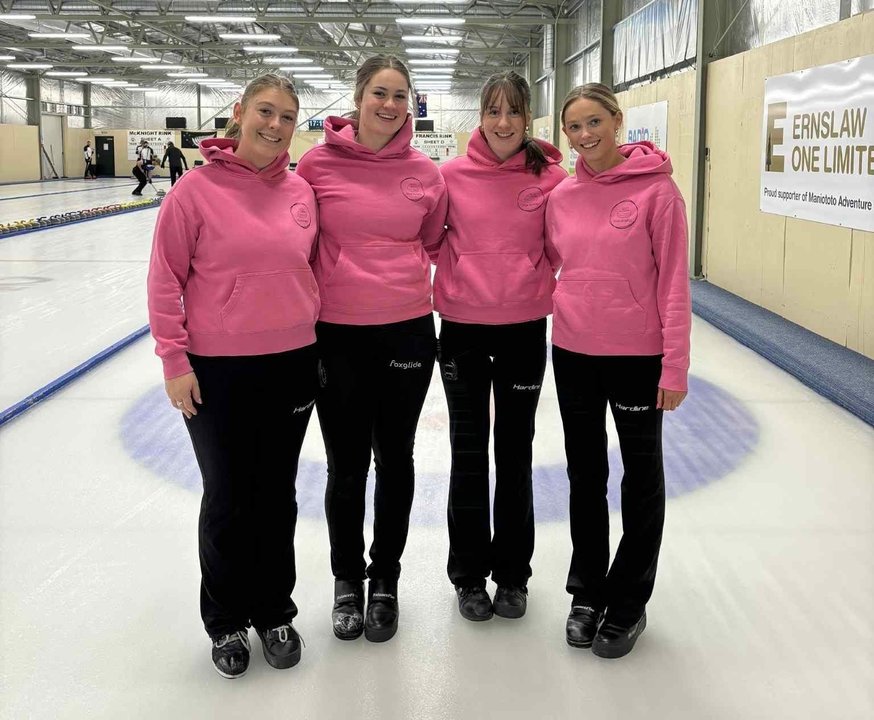
Tahlia Petersen
BCITO Sport Athlete
How do you juggle your curling commitments with your joinery apprenticeship at Leith Joinery? Any tips for others trying to balance both?
I am fortunate enough that my employer at Leith Joinery allows me to take any days off needed to compete in any competitions for curling. Our national season is fairly condensed and takes place throughout mostly June and July. I do find these months to be very tiring as I am spending my weekends at the curling rink training, and every other week driving to Naseby to compete. I have found to balance both that the most important thing for me is to get a lot of sleep, even if that looks like going to bed at 7pm on work nights. My job is very physical so I have to prioritise rest in order to be both mentally and physically in the best shape for my competitions.
What drew you to joinery as a trade? Why did you decide to take on an apprenticeship with Leith Joinery?
I took a gap year after finishing high school in Auckland in 2022, as I was unsure what I wanted to do for a career. 7 years ago my father had a career change and bought Auckland Wardrobes and Doors, a small joinery business in Auckland. During the school holidays in high school, he would employ my brother and I as installers to help him with his work. I found myself quietly loving the work. I loved the attention to detail, and organisation that joinery provides. It is a skilled and specific trade that involves a keen eye and precision.
After moving to Dunedin to start my curling career, I applied in person and online to every one of Dunedin’s joinery workshops, around 17 to be exact. After a month, I heard back from only one, Leith Joinery. I got really lucky with Leith Joinery, they’re a workplace that genuinely cares about its people, and the work that we do. I have found a family with them, and more support than I ever could have asked for in my apprenticeship.
Do the skills you’re learning as a joinery apprentice help you on the ice? How do they cross over?
I don’t think the technical skills learned in Joinery necessarily cross over to curling. However, the aspect of my job that involves working in a noisy, busy workshop with multiple other joiners requires me to become more adaptive to stressful situations on the ice at curling. I find myself being far more calm headed on the ice when the team dynamic may not be working as well. I have also found that working in a loud workshop has taught me to tune out other distractions and be able to focus on the task at hand, this translates to my curling in our larger competitions where the ice rink is full with games and gets very loud. I am able to tune all of the distractions out and focus on the rocks that I’m throwing.

Walk us through a typical day. How do you fit in early morning training, curling competitions, and time on the job at Leith Joinery?
Typically I wake up at 6:30am, and get ready to be at work around 7:15am. I work until 4pm, and then I get home and get ready for either the gym or the curling rink in Dunedin. I try to get to the gym 3 days a week, and every other afternoon is spent curling. However, there are a few days a week where I will head straight to the curling rink after work for training or coaching, and then go from the rink to the gym for strength training.
For weeks where I have a competition, I usually work as many hours as I can until the first day of the competition, and then leave straight from work to drive to Naseby to compete. My boss Peter is very lenient and understanding when I have to work half weeks to fit in my competition, and allows me to balance my work and curling as much or as little as I need.
What’s been the biggest challenge in managing your curling career alongside your apprenticeship?
The biggest challenge for me has been the energy and money spent doing both. Curling is not a cheap sport by any means, and when our competition timetable cuts into three days of the work week, that doesn't leave many days at work to be earning money. Driving to Naseby is expensive, and also tiring after working longer days than usual, to make up for the time missed at work. I definitely find myself feeling extra tired on the Monday back at work after a competition weekend/week.
Does joinery offer you a mental break from the pressure of sport, or does it feel like another demanding commitment?
In many ways Joinery does offer me a mental break from curling, it allows me to focus on something completely different. There are many times where I have come back from competition with so many new things to think about or train for, both good and bad. And also time spent before competition excited with anticipation. Joinery allows me to keep all that at home and just focus on the task in front of me. I have to be switched on at all times in the workshop and therefore that takes all and any space for curling thoughts away, and onto the job, machine or site that I’m working on. Having a life and friends outside of curling also helps to separate my two worlds. I am so very lucky to have found some wonderful friends and family at Leith Joinery. It makes my days so much better being able to interact with the people that I love, in and out of our working day.

Has your experience in curling helped you succeed on-site? How do things like teamwork, strategy, and focus transfer over?
I compete in multiple disciplines of curling, women's (4 players) and mixed gender doubles (2 players). I have curled with many different people of many different temperaments as curlers in my few years of curling. Everyone has a different approach to curling, and their opinion of the technical skills, and how they are best applied. I have found this mirrors the people I have met in the joinery industry, almost identically. Every joiner has been taught in many different ways, what they take from what they’ve been taught is what makes them the joiner they are today. I take advice from many different curlers, likewise with joinery. I am being taught by multiple coworkers and therefore I take from them everything I can, and use what I find fits me and my work best. I have found this gives me the widest breadth of knowledge on and off site to be able to fully immerse myself in learning the trade.
What keeps you motivated when you’re balancing a physical sport like curling with hands-on trade work every day?
It’s definitely hard some weeks to motivate myself to get out of bed in my peak curling season. My body is usually very sore, and there’s times where I lack sleep. What motivates me best is knowing that because I get to work a job that I love, that also pays me, I am then able to continue to fund my curling, which brings me more motivation to work. I am in a lucky position being in a job that while is physically demanding, brings me huge satisfaction day to day. Being paid for it is a really great benefit for doing something that you love.
Looking ahead, do you see yourself continuing with both curling and joinery? What’s the long-term vision?
Looking ahead I always see joinery and curling in my future. I am at a point in my curling career where I have nowhere near peaked, and am able to keep pushing for higher steps of achievement with overseas/international game experience and opportunities. Joinery is a passion of mine and so long as it continues to be a job that I love doing then it will absolutely be in my future. Long term I would love to operate a joinery business of my own, I really enjoy interacting with people, so being in a more client facing role in joinery is definitely the end goal. As for curling, the Olympics is always the goal for us in our sport. New Zealand is a relatively small nation in curling worldwide, which while this means it may be harder to gain access to Olympic qualification tournaments, it also means the competition within the country to get there is less. I aim to be the best in everything I do, both at work and in my sport.
